They came for Darrell Issa. They stayed with their inflatable chicken, blue wall and cakes for political therapy
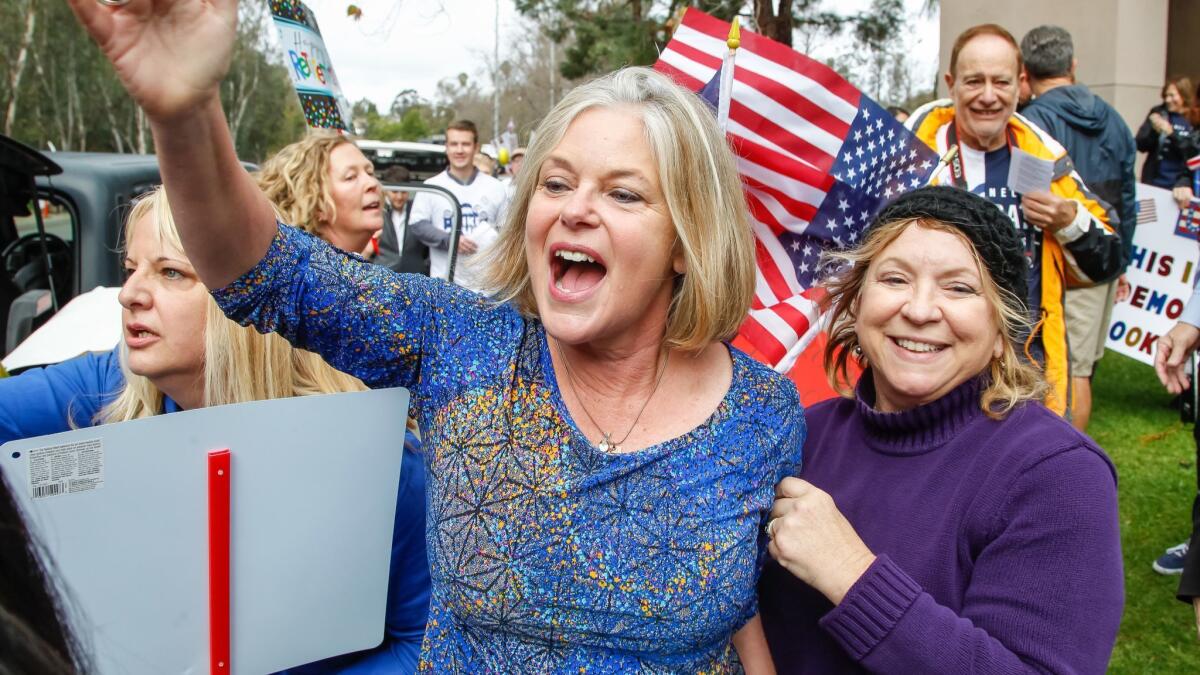
A mother of two turned ringleader of “the resistance” and more than a hundred of her faithful followers gathered on Tuesday morning outside Rep. Darrell Issa’s office in a northern San Diego County suburb. Across the street was her foil, a wedding DJ in a red “Make America Great Again” cap, setting up hefty speakers for an upcoming war of words.
For about 65 weeks the deep divide in America played out along this 100-yard stretch of road in Vista. Here, at 10 a.m. every Tuesday, passersby found signs, chants, songs and, if they were lucky, sometimes a 20-foot-tall inflatable chicken with a Trump-esque coif.
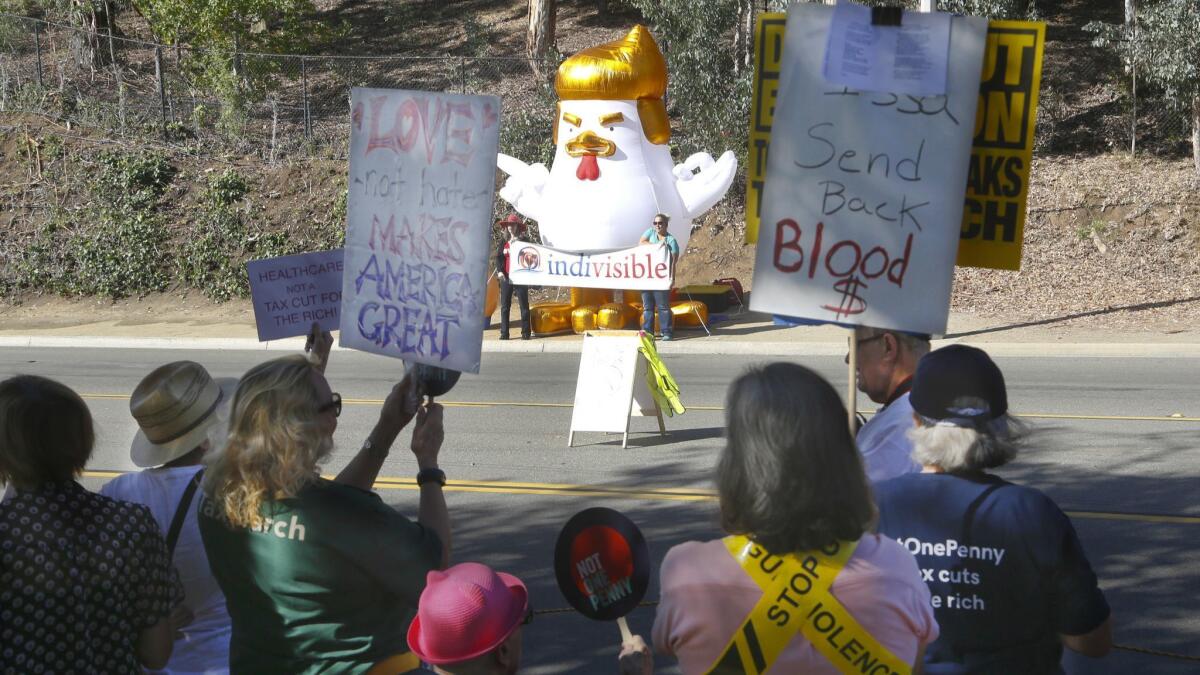
They’d also glimpse the state of the body politic in 2018, a time when shock has turned to anger and post-2016 calls for reconciliation have morphed into grudging acceptance that each side might be better off in their respective corners. Or in this case, their sides of the street.
On Tuesday, the anti-Issa, anti-Trump contingent fought this particular battle for the last time, declaring it their final protest at the congressman’s office. They said they planned to use their energy to knock on doors and get out the vote, with an occasional protest on the side. Their pro-Trump rivals vowed to show up wherever they do.
Get our Essential Politics newsletter »
In a state that already embodies the anti-Trump resistance, it’s fitting that Issa’s turf has been home to some of the most organized, persistent and vocal dissenters. Here, the stakes are high and the ground they’re fighting over narrow: In 2016, the Republican Issa won by just 1,621 votes, the slimmest reelection margin in any House race that year.
The longevity of the protests, which often drew hundreds, gives Democrats hope a wave election to put them back in control is coming in November.
But the hardening on each side is what may give others anxiety about the state of the union afterward.
On another recent Tuesday, wedding DJ Steve Hasty greeted his political opponents across the street.
“Good morning!” he said in a cloying tone. “So happy to see you guys believe in the concept of building the wall!”
He pointed at the contraption that had been erected along the sidewalk, 8 feet tall and willed together with styrofoam, wood and traffic cones reinforced with rebar. At first it was set up to drown out Hasty’s voice blaring from loudspeakers, but the wall also became a stage, painted a Mediterranean blue and sporting a banner that said “CATCH THE BLUE WAVE.”
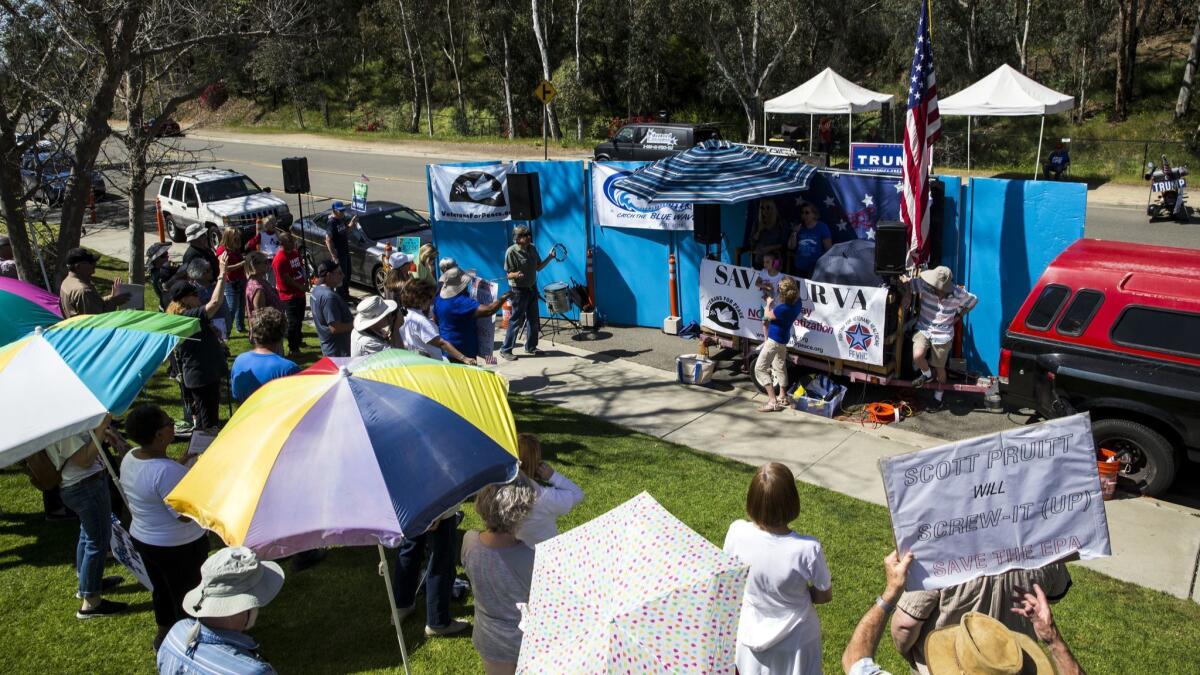
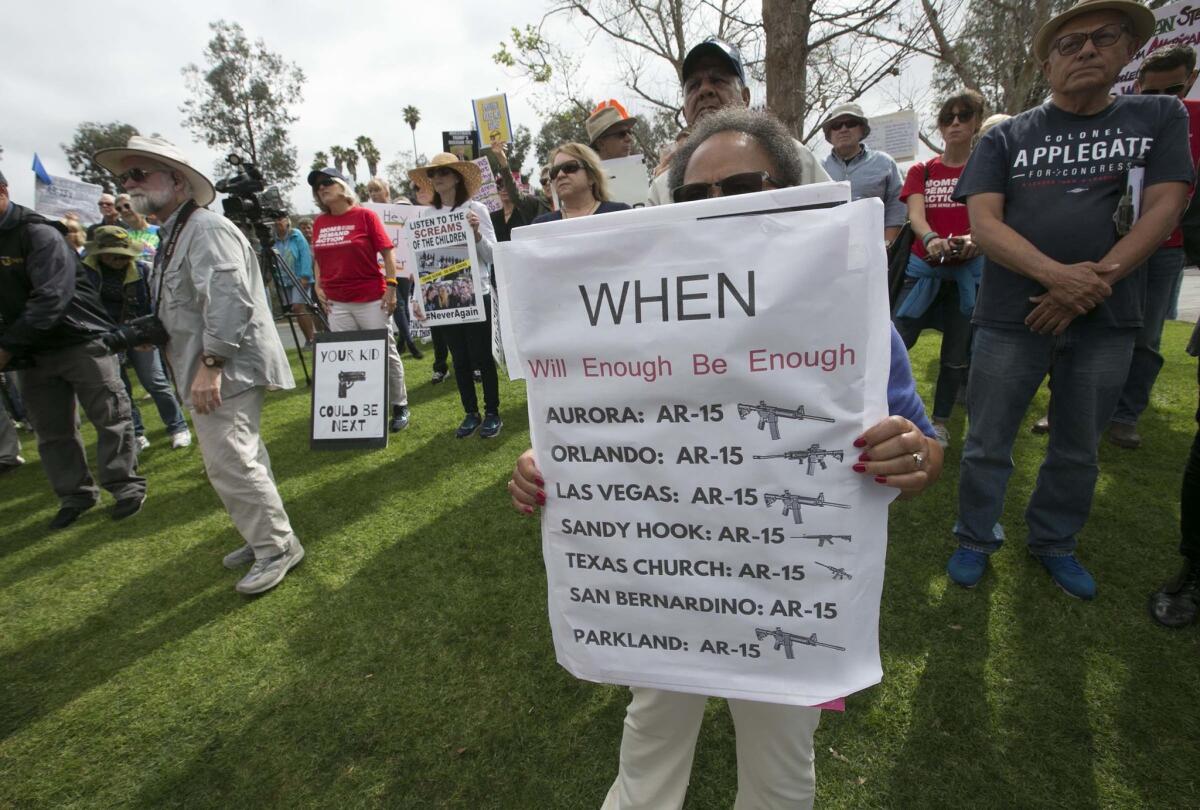
Just past 10 a.m., the protesters, Hasty and several other pro-Trump regulars raised their right hands to their hearts, and in the only moments of unity in the next hour, everyone sang the national anthem.
The peace was soon broken. “I didn’t see anyone kneeling today!” Hasty said.
“We were right here!” shouted a sign-toting couple, hoisting themselves up from the grass.
Ellen Montanari, the 64-year-old ringleader, ignored Hasty.
She started the first of the rallies in 2016, after unfurling herself from the fetal position she said she was in for weeks after Donald Trump’s win. With little more than an email invite and word of mouth, she got a few dozen people to show up outside Issa’s office that first Tuesday.
She largely abandoned her corporate consulting business to plan the protests: coming up with themes, lining up speakers and coordinating volunteers. There was an army of them, mostly retirees or those wealthy enough not to work. Many were former teachers, doctors, contractors and veterans.
See how The Times politics editors rank the toughest House races »
Talk to any of Montanari’s co-resisters and they’ll tell you that these protests, as silly and theatrical as they appeared, were therapeutic.
Maureen, Marcia and Scott were on “peace patrol” to calm shouting matches and help people cross the street safely. Margaret, a retired teacher, became the songwriter. There was Bill, the former masonry contractor who built the wall, and Edith, who left her soul line-dancing class early most Tuesdays to attend. David decked out the donated trailer that served as their makeshift stage, adding a wood frame, plywood boards as a platform, stairs, an American flag and a patio umbrella.
A panoply of people have spoken from that pulpit to preach the gospel of anti-Trumpism: a teary-eyed widow worried about losing her healthcare, billionaire activist Tom Steyer, and, yes, a clergywoman from a local church.
One recent week the sermon was delivered by several high school students who weren’t even old enough to vote.
As a student took the mic to call Issa a “puppet of the NRA,” Hasty shot back, “Guns don’t kill people, mentally ill people kill people!”
His monologue meandered from gun control to abortion, the perils of violent video games, and a claim that Democrats want to raise the voting age to 21. After chanting “Unborn lives matter!” Hasty handed the microphone to his pro-Trump comrade, Sean Colgan, who referenced mass shootings committed by “deranged Democrats.”
Perhaps, Colgan posited, Democrats should just be banned from owning guns. “Clearly, they cannot be trusted.”
The teen across the street, out of sight behind the wall, finished his sentence at almost the same time. “Pretty soon, a lot of us kids will have a vote, too,” the boy said to a chorus of cheers.
Tuesdays weren’t always like that for Colgan, 61, who was showing up to the rallies on his Honda Twinstar motorbike long before Hasty came on the scene. The self-styled “Trump motorcycle guy,” with thick glasses and white hair who’s “medically retired,” was once friendly with his adversaries across the street.
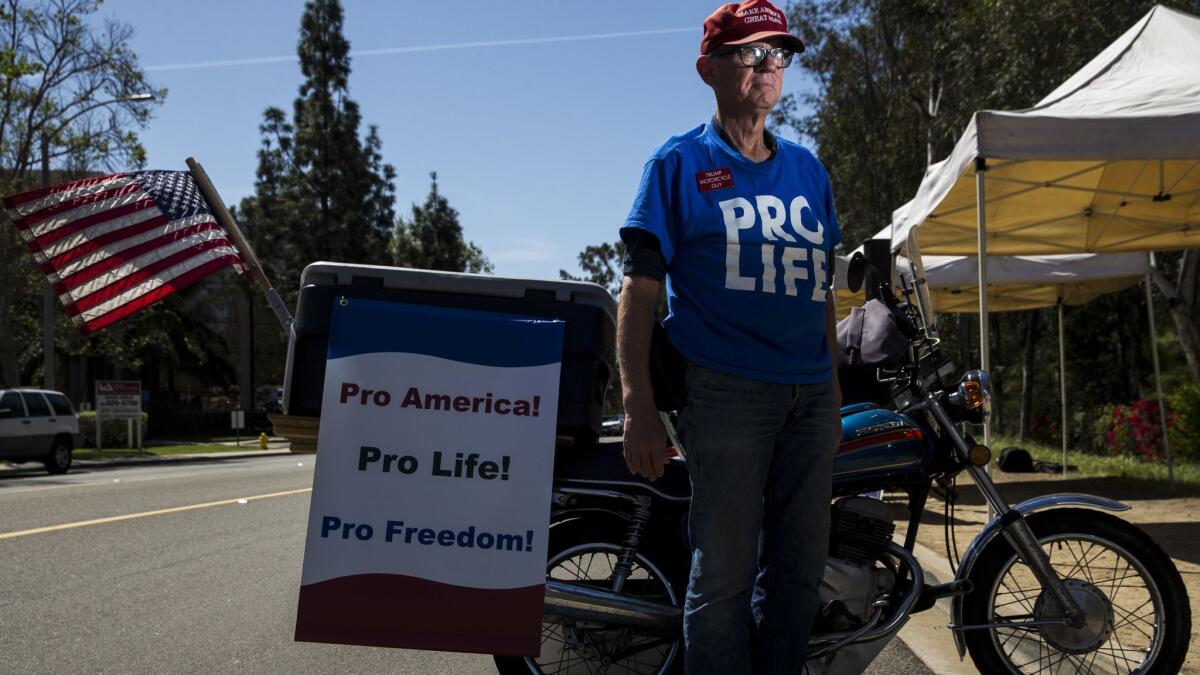
Many protested by his side, waving signs condemning Issa and Trump one moment and sharing doughnuts and bottled water with him the next.
When city officials tried to crack down on the protesters, putting strict conditions on the permit Montanari held, Colgan defended them.
Then Hasty, the 46-year-old DJ and cofounder of a local tea party group, started regularly showing up last September with a state-of-the-art sound system and an arsenal of one-liners.
The resistance was not pleased. A few, Hasty says, left his business negative reviews on Yelp. Hasty decided then that he’d join Colgan every week. Sometimes a few other pro-Trump folks came, but often it was the two of them making just as much noise as the hundreds across the street.
“When they were the only ones with the microphone, and basically had a monopoly, they were fine,” Colgan said. “Now, we’ve got Steve … and he’s a touch more in your face than I am. Because they’re mad at him, they’re mad at me.” Colgan and Hasty were usually relegated to a dirt patch on the opposite side of the street from Issa’s office.
“It’s really too bad,” Montanari reflected later. “But you can’t be over there with [Hasty], with all the vile stuff he’s saying … and then come over and be friends. Sadly, it doesn’t work that way.”
When the group began to sing Woody Guthrie’s “This Land is Your Land,” another tradition, Hasty mocked them for not uniting behind a single Democratic challenger in the crowded race to replace Issa, a mortal danger in California’s top-two primary environment.
“You’ve wasted an entire year of your life!” he shouted over the would-be kumbaya moment. “How embarrassing!”
The anti-Issa protesters worked hard to escape Hasty’s noise.
They upgraded their sound system with crowdfunded equipment worth thousands. One week, the giant inflatable chicken helped block Hasty. Another week, Montanari and others spent hours planning an elaborate joke, where a pickup truck hauled their entire stage a couple of hundred feet up the road just as the national anthem hit its final note. Rallygoers chanted as they followed to the new, quieter spot, leaving Hasty flatfooted.
When the set-up crew moved the trailer three times in an hour, Hasty blared Blondie’s “One Way or Another” over his speakers as he followed in hot pursuit.
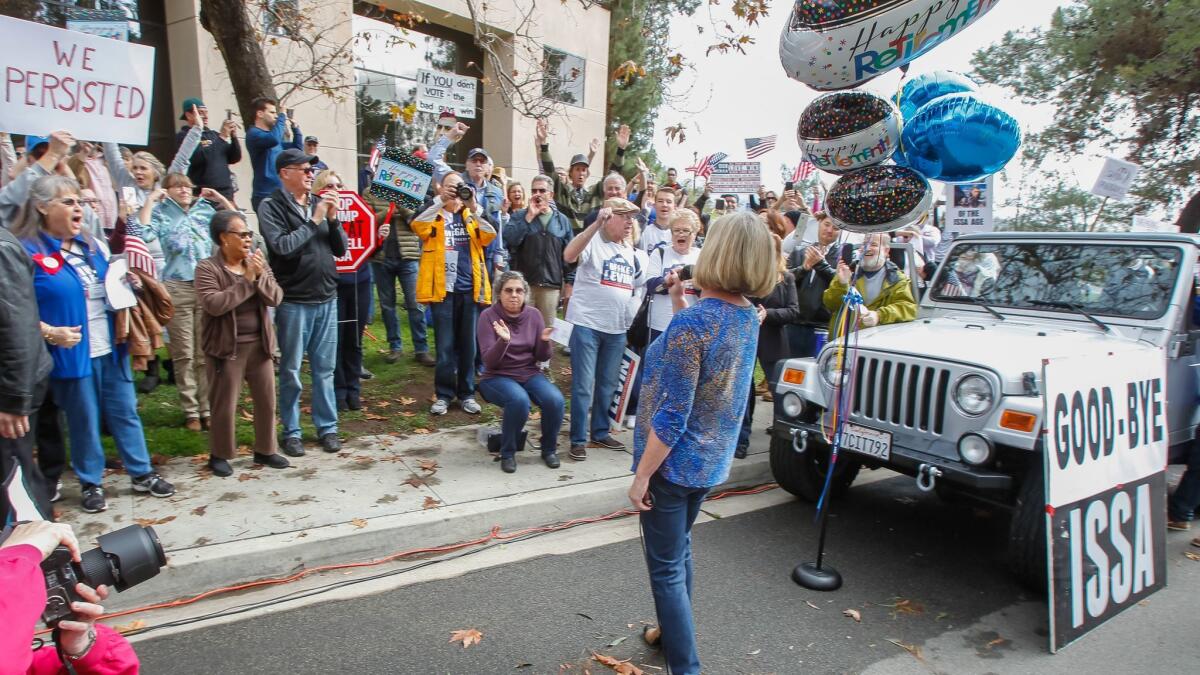
Another staple of the protests was the “leave-behinds” they dropped at Issa’s office door. They’ve left petitions asking for a town hall, brooms and mops urging him to “clean house,” and blackened toast and jam for Issa-you’re-toast day.
Issa usually wasn’t there, so a staffer frequently answered the door, listened politely, thanked them and retreated inside.
In the early days, perhaps when he thought he could contain or outlast them, Issa seemed to approach the protesters with curiosity and bemusement.
Darrell Issa was Obama's toughest critic »
He granted them what they’d been demanding, holding a town hall in March of last year, where he faced an unfriendly crowd. He had another in June, where a select group of constituents received early access to tickets, and also called a couple last-minute “pop-up town halls” outside his office.
He made occasional appearances to greet the crowd and answer questions at the protests. In one of his first, Issa told both sides that America needed calm and civil discourse more than ever. When he showed up a couple of months later, the tension was palpable, but protesters chanted, “Thanks for showing up!” anyway.
Things only got weirder.
The day after Memorial Day, Issa delivered a piece of cake to Colgan. But when he asked to use Montanari’s microphone, she refused.
By the end of the hour, Issa was photographed looking down and snapping pictures from the roof, a bizarre image that went viral.
That same day, Issa called city officials to complain. In a letter a month later, he asked the Vista City Council to keep in place restrictions on the protesters, saying it wasn’t safe and the protesters were disrupting the building’s other tenants.
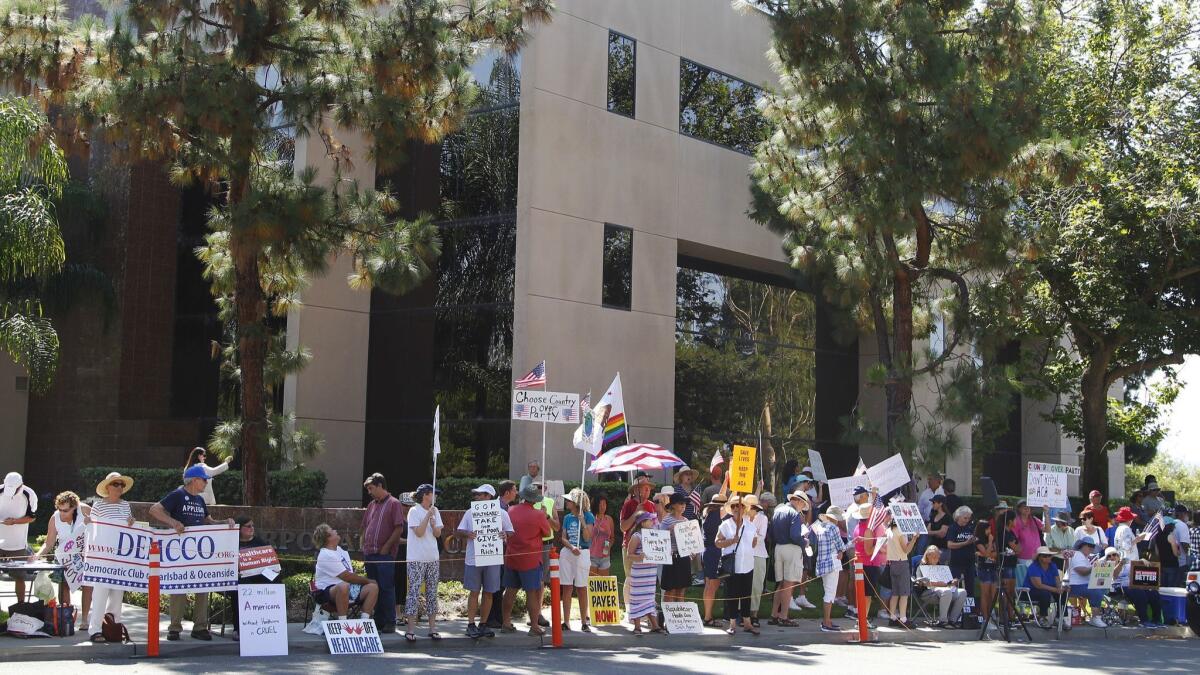
But the American Civil Liberties Union got involved, and city officials lifted the restrictions.
Protesters said the congressman was rarely spotted after that. An Issa spokeswoman contended that the congressman “frequently engaged with protesters” and regularly answered their questions.
In early January, they held a mock retirement party for Issa with balloons and a homemade cake in the shape of a Hawaiian shirt, surrounded by brown sugar “sand.”

Huddled under umbrellas in pouring rain, they sang, “Issa you’ll retire, your situation’s dire, we will soon replace you, never fear. Now we must report, now your time is short, Issa you’ll retire this year.”
The next morning, Issa announced he wouldn’t run for reelection.
Within hours, hundreds showed up to the only Wednesday rally the group ever held. They toasted with apple cider, sang farewell songs and ate another cake.
The next week, they were back again, though the crowds began to thin, soon numbering in the dozens instead of hundreds.
“He's still there. He’s still voting,” Montanari explained.
Eventually, though, Montanari began to change her mind about continuing the protests indefinitely, perhaps an acknowledgment that the demonstrators had made their point.
On Tuesday, they migrated up a hill to a local church for the conclusion of the final protest, celebrating with a cake decorated with a blue wave.
Montanari asked people to raise their hands if they had already been out talking to voters on weekends and working to flip the district for Democrats. A couple of dozen shot their arms up.
“That’s what these rallies have done, folks. We have activated a group of people that is unstoppable,” she said. “I probably spend 40 or 45 hours a week doing this. … We want to take those hours and spend it on the street.”
Down the hill, Hasty was still shouting into his microphone, the crowd long gone. He told the empty street that the protesters were leaving “with your tail between your legs,” and he talked about Hillary Clinton’s email server and discredited conspiracy theories that former President Obama is gay.
The protesters, plotting their next moves toward the June 5 primary up the street, couldn’t hear him.
It seemed to crystallize how bad things have gotten between the two sides of the street, and maybe, the two sides of the country.
But, as in any modern tragedy, a moment earlier that morning offered a spark of hope.
Just before the national anthem played, before the arguing and chants, was the Pledge of Allegiance. And here on this stretch of road outside the office of a congressman who’ll soon be gone, people on both sides put their right hands on their hearts and recited it together.
Coverage of California politics »
For more on California politics, follow @cmaiduc.
Get the L.A. Times Politics newsletter
Deeply reported insights into legislation, politics and policy from Sacramento, Washington and beyond. In your inbox three times per week.
You may occasionally receive promotional content from the Los Angeles Times.








